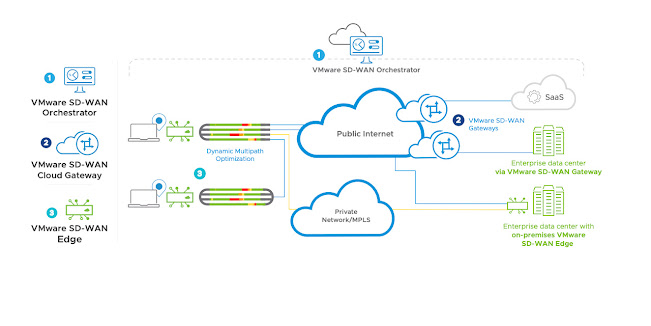"High Away Blues Nr 1" or Challenges in Edge High Availability Part 1: VRRP HA
Configuring different High Availability Features one Branch Setup in my lab was using an MPLS CE-Router and VRRP to allow a restricted Fault Tolerance.
When the VMware SD-Wan Edge goes down, there is still a working MPLS connectivity via the CE Router, which means the Branch in that case behaves like a NSD (Non-SD-Wan enabled site) and you need to have a forwarding via either a hybrid Partner Gateway or Hybrid HUB site to still be able to reach all necessary destinations.
The MPLS-facing CE-Router in my case is a Cisco IOS L3 Router, MPLS connectivity for that customer is using OSPF
On the VCO the Edge BR-20 has the corresponding VRRP-setting
GE1 is the Link from Edge to the CE-Router using pt-2-pt OSPF
In the WAN Settings GE1 is marked as User Defined Wan Overlay of type Private Wired named MPLS-Cust-2
The necessary Enable Wan Overlay Flag is correctly set, telling the Edge to also build Overlay tunnels to Gateways using that connection towards MPLS via the CE-Router
BUT ...
Unfortunately the MPLS Overlay does not come up with that configuration
But we see that our VRRP configuration is also detected and up
When using the List Paths in the Remote Diagnostics section we only see overlay tunnel built to 2 Gateways via the 110.1.1.0/24 Internet connection
So now we have a seemingly correct configuration, but no Overlay tunnels over MPLS
Let´s have a look into one of the MUST-HAVE (and MUST-READ) documents
"SD-WAN Reference Design Guide" White Paper April 2019
On page 7 we find some useful information regarding requirements so that Tunnel initiation message will be sent out and reaches the defined SD-Wan Gateways
So according to the info found here we specified all the necessary information for Wan Overlay
Looking further into the Edge BR-20 we can find all necessary MPLS destinations learned via OSPF and primarily pointing to the GE1 interface towards the MPLS CE-Router
Looking further into the above mentioned Reference Guide you can find on Page 8:
But again we have 2 Gateways as remote peers connected to the correct MPLS/vrf as well, so that requirement is given in our case
However the only thing missing is the automatic Default Route pointing out interface GE1
Unfortunately I did not get any useful information from the official VMware SD-WAN documentation .
After some useless tries by comparing route table with other working SD-WAN Edges, I found the solution.
Even though we have an OSPF pt-2-pt Interface on GE1 with only a single OSPF learned neighbor, we need to configure the neighbor address as Gateway address in the interface configuration.
Only then the necessary Default Route out GE1 will be automatically set-up.
Using the default route out of an Wan Overlay enabled interface tunnel initiation messages will be sent and when they reach the selected Gateways Overlay tunnels via interface GE1 and MPLS will be set up.
Now we have the necessary Tunnels 2 each to our 2 selected Gateways
RESUME: Whenever you need to manually configure IP-Address on an interface used also for WAN Overlay you additionally HAVE TO configure the upstream neighbor address as Gateway address
This concludes Part 1 of our journey into VMware SD-WAN High Availability. Stay tuned for further findings in that area.





Comments
Post a Comment